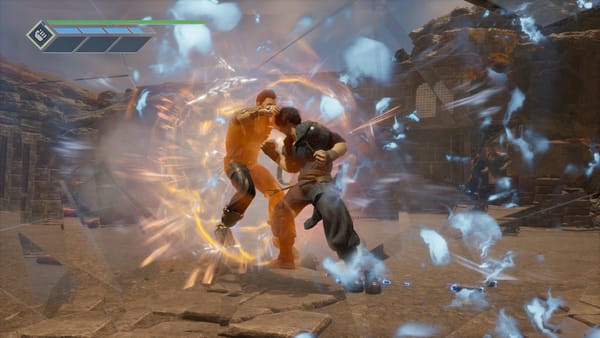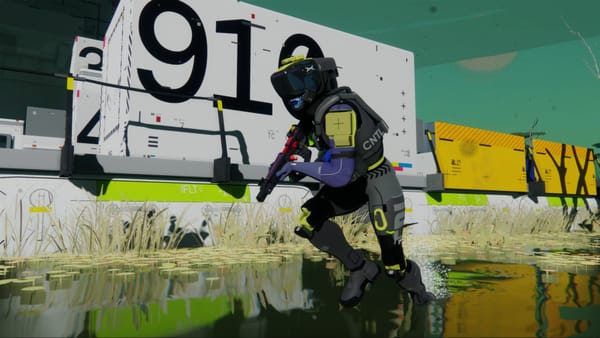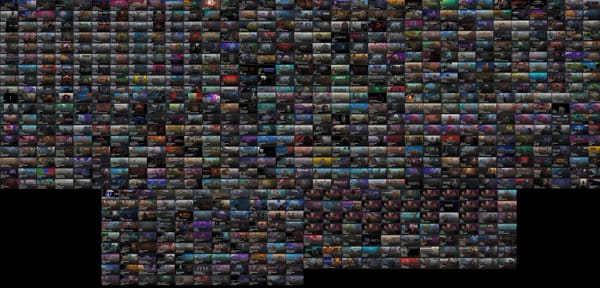#150: Down stream
Stadia died like Hemingway went bankrupt: gradually, then suddenly.
Today I was going to follow tradition, and do a sort of state-of-the-union thing. I spent #50 and #100 doing some navel-gazing, sharing some data, reflecting on how the newsletter was doing and where it was heading. So I figured I’d do the same again for #150. Then Google finally killed Stadia, so I suppose we’d better get through the numbers quickly and then dig into all that.
When I published #50 a little over a year ago, Hit Points had 943 readers, of whom 55 were paid subscribers. When #100 rolled round in March, that had grown to 1,484 and 125 respectively. At the time of writing, Hit Points has 3,699 readers, of whom 228 are fully paid-up members of the crew. That’s really very nice, isn’t it. I am quietly delighted. My thanks to you all. But! But, but.
Back in #100 I said I was more focused on growing the free side of Hit Points. It felt like it would be easier to scale, and the data to that point suggested that the paid list would grow in proportion. The latter hasn’t quite happened, and the lesson I am choosing to learn from this — which is pretty obvious, really — is that in its current form, Hit Points neither does enough to encourage new paid subscribers, nor to reward those who are kind enough to pay. I think it’s time that changed.
From next Monday, October 3, one Hit Points edition every week will be exclusive to paid subscribers. My goal is to do this without taking anything away from those on the free list: in a busy week with lots to talk about, there will still be two free posts, with a third for paying members. But those of you who’ve been here a while know that Hit Points doesn’t like to waste people’s time. In a quiet week there may only be one free post, or if things are particularly miserable, there will be none for free folks at all.
This is a risk, I realise, and I’ve wrestled with it a lot. Hit Points has, for much of its life, been at something of a crossroads. It has long been apparent that I need to do more to both encourage and reward paid subscribers — but the economic reality of the newsletter made it very difficult for me to do so. Revenue, as I type, is hovering at around $15,000 per year, and it’s been there for a while. That is barely enough to keep the younger hellspawn in trousers. (Seriously, holes in the knees within weeks, whatever the material. There ought to be a law against it.)
Anyway, look, we’d better get on. A reminder, if you need it, that Hit Points is fully independent, ad-free, and holds no truck with SEO or any of the other dark tricks today’s online media tends to pull. I am not trying to show you ads based on your browsing history — I bought two new radiators the other week and now the internet appears convinced I am super into radiators, The Radiator Guy — or sell you a new keyboard via affiliate link.
I provide what I hope is an insightful and informative, personal and honest, and often quite funny perspective on the latest goings-on around the game industry. I do good, useful work, I reckon. On Monday I wrote 4,500 words about a frank and honest conversation I’d had with a game developer about the struggles he’s had trying to build something crazy, and several dozen websites turned it into ‘the PUBG guy is making a blockchain game lmao’. That’s the Hit Points difference, I suppose, and I can think of no finer sales pitch for why you should pay the princely sum of £4 per month to help ensure it continues. I hope that you agree.
Oh, and Max HP is back soon. Next weekend, in fact. With Tetsuya Mizuguchi! We really are going up in the world.
Right, yes, Stadia. On with the show.
I do not think any of us were particularly surprised at yesterday’s news that Google is closing down its short-lived cloud-gaming experiment; this is not a company renowned for its persistence, and it has been hacking away at the thing with a butter knife for some time now. The axe was always coming, then, but I was personally quite saddened to see it finally swing. Stadia had so much potential. It actually worked, a lot of the time! And there were just enough use cases for it to suggest that maybe Google should have stuck with it a while longer.
I know a number of developers who were using it for playtesting, and found it such a godsend during the pandemic that they have stuck with it even after returning to the office. A few pals are quite upset that they no longer have a way of playing Destiny 2 on Steam Deck (Bungie doesn’t officially support the device, considering it to breach its anti-cheat systems). And Stadia was, for many, the best way to play Cyberpunk 2077 at launch, since the service’s powerful remote hardware could brute-force through many of the game’s early issues in the data centre. There were two types of people who thought Cyberpunk was good at launch: people with £2,000 PCs, and people with Stadia. This has not all been a complete waste of time.
Yes, this is Google, and the law of averages dictates Stadia wasn’t going to be around forever (in fact, when it closes in January it will have fallen short of the average lifetime of a failed Google project by ten months). Sure, there is something quite cathartic at seeing some titan of capitalism falling flat on its arse in this fashion, especially when Phil Harrison is involved. But Stadia promised, and had the potential, to transform the way people discovered, accessed and played games, and Google had the financial might — and, it seemed at first, the desire and intent — to see it through. I think there will always be a small part of me that wonders what might have been.
So, where did it go wrong? In every single way apart from the tech, as far as I can tell. The business model was a disaster, built on the misguided belief that you could remove loss-making hardware, physical software overheads and the entire concept of ownership from the traditional console equation, but still charge everyone £50 for games. The software offering was pretty miserable too, fairly plainly designed by a company that has made its riches by building technology and services and letting other people worry about #content. There was nothing that alluring that you could only play on Stadia, and what was there did little to truly quicken the pulse.
Most fatally of all, after doing the hard work on the core streaming tech over a number of years, Google figured it could just spin up and launch a gaming platform in a matter of months. The warning signs were on full display at Stadia’s coming-out party at GDC 2019, when Jade Raymond was unveiled as the new head of Stadia Games & Entertainment and gave the impression she had signed her contract the night before. (It was actually a week earlier.) Raymond is an experienced and trusted builder of studios, forming Ubisoft Toronto and EA Motive from the ether. And she clearly works fast, having since sold her new outfit Haven to Sony less than a year after it opened its doors. But she cannot work miracles. Her hiring, so late in the day, reflects the shocking extent to which Google underestimated just how hard, how expensive and how time-hungry the business of making games really is.
Then, of course, we have Phil Harrison, who was a… let’s say ‘curious’ appointment from the start. What exactly did Google see in one of the minds behind such cautionary videogame tales as PlayStation 3 and Xbox One, and who resigned as president of Atari after quadrupling losses in the space of a year? It is not a CV, I fear, that exactly screams success. Harrison is one of the game industry’s true enigmas, a man who has spent the better part of two decades failing consistently upwards to the continued bafflement of everyone except the people that keep hiring him. I would assume he interviews well, were it not for the fact that he once messed up one with Eurogamer so badly that he got his PR to ask Hit Points chum Tom Bramwell back into the room so he could have another go. I can’t wait to see where he ends up next. My money’s on blockchain stuff — plenty of suckers over there — but I imagine he has loftier goals. Tory leader, perhaps. Perfect fit.
So, given all that, the death of Stadia has come as no surprise. Unless you’re making a game for it, that is — Twitter is full of affected game developers, one of whom was supposed to be launching a game on Stadia this weekend — or actually worked on it: contract discussions and release planning continued until minutes before the press release went out. (For more, see this excellent piece on Kotaku.) Google is certainly doing right by Stadia’s customers, refunding all purchases of hardware and games since launch in full. I hope it will treat developers, who signed up to make games for the platform in good faith and assumed the axe in the corner was just there for decoration, with the same level of respect.
MORE!
- In the above story I refrained from telling any of the probably-quite-libellous stories I have heard about Phil Harrison over the years. (You will simply have to get me drunk like everyone else.) But here’s another banger for the archives: supposedly Harrison personally canned an exclusive Death Stranding sequel because he thought there was no longer a market for singleplayer games. Firstly: incorrect. Secondly, there wasn’t much of a market for Stadia at the time either, Phil! I think this might have helped a bit!
- Savvy Games Group, the gamewash- sorry, game-investment wing of the Saudi state-owned Public Investment Fund, says it will splurge $37.8bn on game-industry acquisitions. Of that, $13.3bn has been earmarked to acquire “a leading game publisher”. Weird figure, that: it would buy three-quarters of a Take-Two, 40% of an EA, or roughly four Ubisofts. Ho hum.
- Sega’s first blockchain game will be a new instalment in its arcade RTS series Sangokushi Taisen, developed by Japanese blockchain nobbers Double Jump Tokyo.
- Overwatch 2 sounds a bit pump. Shame.
- Boutique physical-game publisher Limited Run has announced a new book imprint. Cannily named Press Run, it intends to release a new game-themed book every month. As someone who made a 132-page magazine every month for seven years and almost came apart at the seams as a result, I wish them all the luck. They’re going to need it.
There we go! This is normally the bit where I hard-sell shares and subscriptions, but I wrote all that stuff up top so could you just go and read that again, perhaps? Thanks. Have an excellent weekend, whatever you’re up to, and I’ll see you all next week.





